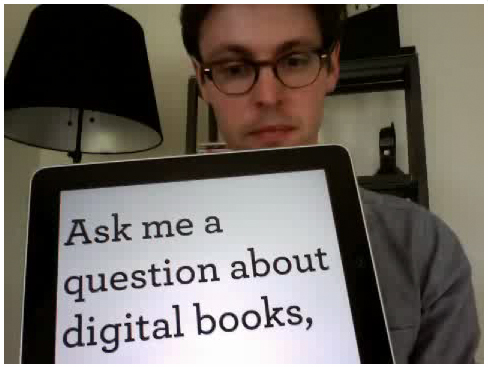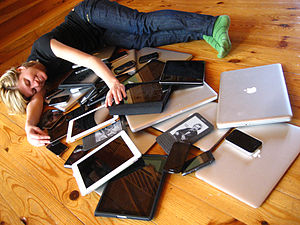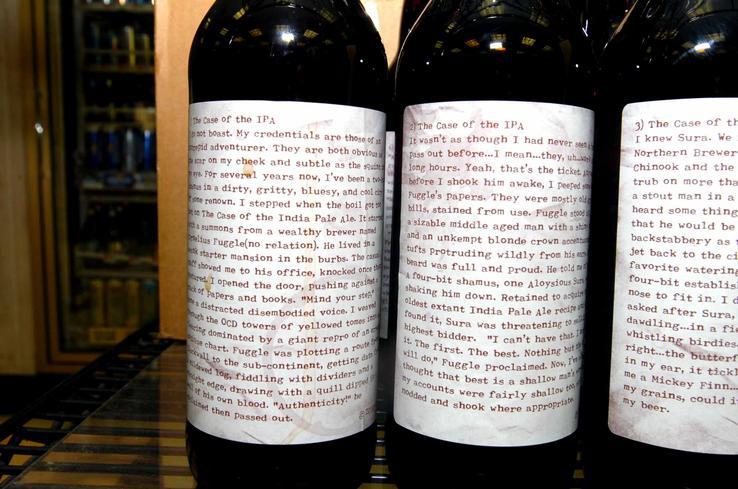Digital Book and Audio Book Integration
Drew Frist is the founder of Electric Type (@electrictypeco), a digital book publisher who just released their debut digital children’s app, Jungle Book: The Story of Mowgli & Shere Khan. It looks delicious! Check out the promo video, and I’m guessing that if you have kids you’ll head over to iTunes before long.
In a recent video response to the question, “What are your thoughts on audio books?”, Frist expressed a wish that I’ve been trumpeting for months: it’s time for user friendly digital book and audio book integration. Print books are familiar and nostalgic. Digital books are cheap, quick, frictionless and they eliminate paper cuts. Audio books are perfectly portable and they expand our reading opportunities to the car, the gym, the ski slopes.
Why aren’t we bundling all three? This value-added merchandising play is not only good business in an increasingly competitive publishing world, it’s actually better than all three. In short, bundling digital, audio and print is better than the sum of its parts.
Most of us still love paper and ink. Bindings. Smells. Easy marginalia. Worn pages. Dog eared corners. It’s a habit with some enduring benefits (ever read your iPad in full sun?) and a viable long tail. In short, many readers still want print books.
Digital book detractors have not immersed themselves in the experience. Just my two cents, but I find it hard to believe that print book purists don’t accept that there are some amazing opportunities with digital publishing. Instant access to almost everything no matter where you are. Did I mention instant? Did I mention cheap? Did I mention searchable content? Okay, the technology is still new and rather clunky, but progress is being made at warp speed.
I admit that once upon a time I scoffed at audio books. Remember when they were recorded on tapes? When they were almost all abridged? When the audio book technology and availability were more hindrance than help? I changed my tune almost a decade ago when my then-fling-now-bride and I were commuting between the Adirondacks and Manhattan. Five hours in the car wrestling with tailgators and snow storms was transformed into five hours of “reading” books that we might not otherwise have taken the time to squeeze into our busy lives. Outstanding recordings, many by the authors themselves, and none were abridged. In those early days we listened to CDs. Remember those? The advent of compact disks reduced the need to abridge books because they could hold so much more data than tapes. Before long we transitioned to MP3 downloads from places like Audible.com and enjoyed the dilated offerings and the instant access. Driving bliss. It wasn’t long before audio books crept into my workouts, flights, train rides, etc.
So spoiled! So many choices. So much bickering about which one is best.They’re all best! Do you remember this video?
We have so many amazing resources at our fingertips, and yet we live in a culture where opinions are celebrated without necessarily stopping to evaluate or analyze them. Remember debate? No? It was a logical, quasi-methodical framework for constructively addressing differences of opinion. Weird, right? I know. Now we just shout opinions, whine opinions, burp opinions, snore opinions, regurgitate opinions, sweat opinions and generally excrete opinions around the clock. It’s cool. It’s social…. ;-)
An avalanche of opinions. But are we evaluating and analyzing this avalanche of opinions, or are we just scrambling to keep our heads up and our opinions spouting? Is anyone stopping to ask if print books, audio books and digital books need be mutually exclusive? With such distinct merits and appetites for all three, it would make a world of sense to zip them all up together in the same pair of pants so that they could audition for the lead roll in our storytelling opera.
Some of my best book experiences lately have resulted from buying all three formats, and in many cases re-consuming large sections of the work in multiple formats. Active writers, researchers and thinkers would relish the opportunity to:
- buy a bundled, multi-format title from their favorite seller
- tuck into the hammock to read the print book in the shade of a towering oak tree
- continue the story on their iPod while mowing the grass
- bookmark a quotation while listening to the audio book so that they can send it off via Twitter or email
- sync the audio book with their digital book reader to pick up where they left off
- quickly locate and share the bookmarks via email, blog post, Facebook, etc.
So often while I’m listening to an audio book I’ve yearned for a quick and easy way to bookmark, quote or share a passage. So often while reading a digital book I’ve yearned for a high-quality audio performance to pick up where I need to leave off to drive to a meeting. So often while reading a printed and bound book I’ve yearned for an efficient way to search for a passage…
Isn’t it time that we integrate digital books and audio books seamlessly in a single, user-friendly app? And wouldn’t it be great if this integrated digital app were bundled with a print copy? It’s a win-win-win proposition!
Related articles
- Blowing Out the Digital Book as We Know It (downes.ca)
- Digital Reading: To Do Digital Books Right, Writers Will Learn to Talk Tech (digitalbookworld.com)
- Digital book sales soar in the UK (bbc.co.uk)
- New Releases in the Digital Book World, 5/13/11(digitalbookworld.com)















